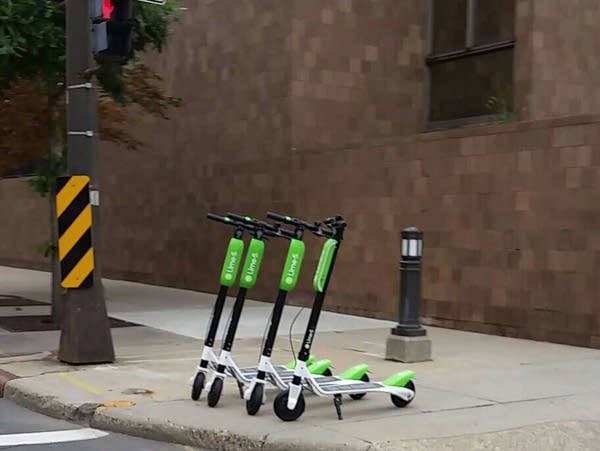In comes winter, out go app-based electric scooters

Bird and Lime, the two electric scooter companies that serve the Twin Cities, round up their fleets for the winter beginning Friday, ending a first-of-its kind mobility experiment.
About 1,000 scooters rolled onto metro streets in July, a hybrid of the sharing economy, alternative energy and youth culture. By all accounts, folks like them — even those who fell off.
Lime, one of the two companies that put the scooters out, reported more than 200,000 rides taken by customers since the scooters formally launched in late July.
"We saw great ridership, good adoption. Good percentage of folks use our scooters multiple times, which is really what we wanted to see, to show that it's a dependable transportation option, and not just a novelty," said Eric Kocaja, general manager for Lime in the Twin Cities.
Create a More Connected Minnesota
MPR News is your trusted resource for the news you need. With your support, MPR News brings accessible, courageous journalism and authentic conversation to everyone - free of paywalls and barriers. Your gift makes a difference.
Bird, the other company, hasn't yet released its ridership figures.

Users found the electric two-wheelers worked for "last mile" trips to and from public transit, and other short trips that aren't practical for a cab, Uber or Lyft.
But some complained that scooters cluttered sidewalks and even blocked access for those in wheelchairs.
In St. Paul, the city reached a pilot program agreement with companies with some restrictions. The city's public works director, Kathy Lantry, was satisfied with the pilot, but said rider behavior was a problem at times.
"They're not allowed on sidewalks, they're only to be ridden in the streets, so we need to work with the scooter companies to figure out how to more robustly make sure that information is available to the rider," Lantry said.
She said scooters wound up in park areas, where they interfered with mowing and other maintenance work.
Minneapolis officials have reported similar issues and say they got a fair number of complaints about the scooters, but found the companies pretty responsive to concerns the city brought forward.

Josh Johnson with Minneapolis' Public Works Department called the scooter experiment "very successful. I think we've been definitely surprised at how much use. It's not just novelty for people, it's really providing a meaningful transportation option."
Johnson said city staff are likely to recommend the Minneapolis City Council approve putting them back on the street when the weather warms up.
But people were hurt, although neither Minneapolis or St. Paul reported serious injuries from scooter use. Jessica Bailey of St. Paul had trouble controlling her app-based scooter on her way to a Minnesota Wild game and jumped off, fracturing her ankle.
"Knowing who I am, I imagine that I will eventually get on them again, because they are really convenient and affordable," Bailey said.